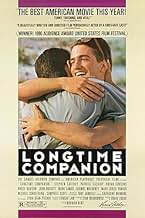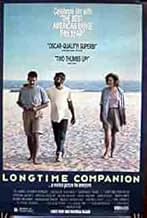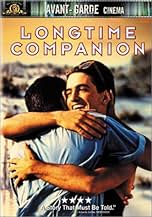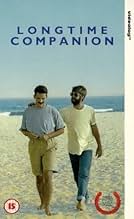AVALIAÇÃO DA IMDb
7,6/10
6,4 mil
SUA AVALIAÇÃO
Adicionar um enredo no seu idiomaThe emergence and devastation of the AIDS epidemic is chronicled in the lives of several gay men living during the 1980s.The emergence and devastation of the AIDS epidemic is chronicled in the lives of several gay men living during the 1980s.The emergence and devastation of the AIDS epidemic is chronicled in the lives of several gay men living during the 1980s.
- Indicado a 1 Oscar
- 6 vitórias e 6 indicações no total
Avaliações em destaque
Blondie's hit record opens this early AIDS film, a kneejerk reaction to the hysteria that was happening in the world in the wake of so many deaths from what was still viewed as 'the gay plague'.
'Longtime Companion' centres on a group of friends who are affected by AIDS in various different ways - two are victims of the disease, while others survive to remember their friends with affection. There are one or two stereotypes here (the camp Fuzzy, who mimes to disco records), but in the main the characters are played with sensitivity (and a degree of humour): Bruce Davison, Mark Lamos, and Campbell Scott stand out from a good cast.
I particularly liked the moving and celebratory ending, a surreal segue which brings everyone together in a huge, joyous beach party where everyone is alive, in love, and together. This single scene says more about the effects of the AIDS epidemic than many other right-on scenes from more traditional films.
'Longtime Companion' centres on a group of friends who are affected by AIDS in various different ways - two are victims of the disease, while others survive to remember their friends with affection. There are one or two stereotypes here (the camp Fuzzy, who mimes to disco records), but in the main the characters are played with sensitivity (and a degree of humour): Bruce Davison, Mark Lamos, and Campbell Scott stand out from a good cast.
I particularly liked the moving and celebratory ending, a surreal segue which brings everyone together in a huge, joyous beach party where everyone is alive, in love, and together. This single scene says more about the effects of the AIDS epidemic than many other right-on scenes from more traditional films.
Following in the footsteps of AN EARLY FROST, here is yet another film with an AIDS theme to reckon with. Unlike FORST [which actually dealt with a gay couple and their parents] this deals with the gay community and several lover relationships. What I like about this film, and I did like FROST, was the honesty in telling the story of relationships. We are introduced to a group of gay friends and their mates, who spend much time together in vacationing on Fire Island, the gay resort, and in the hospital visitng each other when stricken with the unknown disease that has become a plague amongst us today. The actors brought their own individual depth to each character. I couldn't find a bad performance in the lot. Notably Bruce Davison stands out. He brings such an understanding and compassion to his work. You really believe him as he becomes his partner's companion in the last days of his life. The scene when he tells him it's okay to leave, was awesome. How can you separate the good actors from acknowledgement. Campbell Scott and Stephen Caffrey, Patrick Cassidy [and that famous kissing scene on the soap he was acting in] gave such a wonderful scene when he's in his lover's hospital room and begins to break down. The face of his lover as he listens to him cry broke my heart. John Dossett, Mark Lamos and Dermot Mulroney [and I'm not sure what actor played what role] all gave so much honesty to their work. A great ensemble of players, a delicate and honest script about a controversial disease that has by this time taken the lives of millions of young people [gay and straight], excellent direction and well photographed, I highly recommend this to everybody to see. You'll come away with a different attitude about not only gay life, but the killing disease.
Longtime Companion chronicles the lives of a group of gay men during the 1980s. The focus of the film is AIDS, unknown to the men when the film opens in 1981, but by the end of the story in 1989, it has become the central defining event in the lives of the survivors. Shot in almost documentary style the story is told almost matter-of-factly. But the reality of the lives of the men in the story is not matter-of-fact; they are dying and dying in the prime of their lives. It's heart-rending. In this, the movie succeeds very well, raising awareness of the effects of AIDS, and putting a human face to its victims.
The title is the newspaper obituary euphemism for a gay lover, and yet another discreet but frustrating reminder of how mainstream heterosexual society avoids confronting the AIDS epidemic. In an effort perhaps to offset public ignorance, Norman René's film of the same name almost resembles an AIDS awareness primer, dramatizing the deadly progress of the disease through the gay community since the summer of 1981, when 'safe sex' merely meant anything goes, but don't get caught. Like other American Playhouse productions the film is simple, unpretentious, and no less rewarding for being so straightforward. René and writer Craig Lucas have wisely resisted the temptation to make a 'Love Story'-style terminal illness melodrama, concentrating instead on the bittersweet pain and bravery of awkward hospital visitations and quiet deathbed encounters. Only the forced optimism of the final daydream rings false, unavoidably since the epidemic itself (still) has yet to be resolved by anything resembling a cure. The balance of the film is simply too honest to support such sentimental wish-fulfillment fantasies.
I was a physician in New York City from 1989 until 1992, and saw a tremendous number of people with AIDS. I feel that this movie, although it may appear to be dated, is an excellent portrayl of events that were all too common at that time. It gives a good sense of the confusion, misinformation, sense of being lost, and of not knowing what to do for those suffering and for their friends and companions. The actors did an excellent job in showing this. I believe that this movie is still important and merits being shown often.
Você sabia?
- CuriosidadesThe title refers to the only way that newspapers at the time would allow a gay man's lover to be listed in an obituary.
- Erros de gravaçãoIn the segment marked "July 3, 1981" people dance to the song "Do You Wanna Funk?" by Sylvester, but this song was not released until 1982.
Principais escolhas
Faça login para avaliar e ver a lista de recomendações personalizadas
Detalhes
- Data de lançamento
- País de origem
- Idioma
- Também conhecido como
- Longtime Companion
- Locações de filme
- Empresas de produção
- Consulte mais créditos da empresa na IMDbPro
Bilheteria
- Orçamento
- US$ 3.000.000 (estimativa)
- Faturamento bruto nos EUA e Canadá
- US$ 4.609.953
- Fim de semana de estreia nos EUA e Canadá
- US$ 50.525
- 13 de mai. de 1990
- Faturamento bruto mundial
- US$ 4.609.953
Contribua para esta página
Sugerir uma alteração ou adicionar conteúdo ausente


































